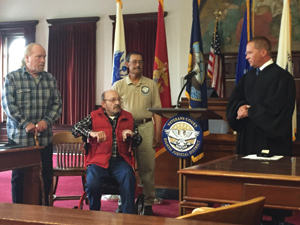
DAV, Veterans Treatment Court help reunite estranged brothers
Second chances are a rare gift that most everyone, at some point, wishes they had. For 70-year-old Montana veteran Robert Heryford, that second chance came just in time.
Robert struggled for more than half his life with alcohol abuse—his attempt to cope with post-traumatic stress disorder stemming from his service in Vietnam. The drinking severed him from his family, including his twin brother, Bill.
Plagued by addiction, he drifted in and out of treatment programs, only to return to alcohol. In 2016, his substance abuse problems led to legal trouble, and he entered the Great Falls Treatment Court. The program—one of hundreds in the country—helps provide treatment options and alternatives to jail for military veterans who have committed low-level crimes and are experiencing service-related issues like PTSD.
As Robert started the program, he reached out to his twin in Washington state and they began slowly, cautiously rebuilding their relationship.
“At the beginning of the program, Robert was still in denial,” said Bill. “But I decided I was with him all the way. Then all of a sudden, it snapped, and he just started working the program. He decided he was going to beat it—and he did.”
Robert credits his success to the Veterans Treatment Court. “It makes a difference when you have support,” said Robert. “It’s not just a job for someone. They’re doing it out of their heart, not their pocketbook.”
Life was getting better for Robert and Bill, and their relationship continued to heal. But fate was about to deal Robert a new, unexpected blow.
Shortly before he was set to graduate from the 24-month program, he began to notice issues with his balance and stability. After numerous tests, Robert was diagnosed with amyotrophic lateral sclerosis, more commonly known as Lou Gehrig’s disease. Worse still, just as he was working to mend his family relationships, doctors estimated he would have only six short months to live.
In the early weeks of his treatment in the program, Robert had met DAV National 3rd Junior Vice Commander Joe Parsetich, who is the court’s mentor coordinator. Parsetich helped manage his case and was one of the first people Robert confided in after receiving his diagnosis. Parsetich immediately began working to make the brothers’ lives easier after the devastating news.
“Thank goodness for the resources at DAV,” said Parsetich. “We were able to get Robert’s disability upgraded to 100 percent almost immediately. DAV funds allowed us to help Robert prepare for end-of-life issues, as well as the opportunity to make Robert’s time more meaningful.”
Due to his hard work and success, Robert was allowed to graduate from treatment court two months early. Upon graduation, there was a surprise in store. Among the guests, Robert saw a familiar face, whom he hadn’t seen in 11 years: his brother, Bill. The brothers embraced and cried, reunited after many years of physical and emotional distance.
“There are some financial challenges within the family, and we were able to use DAV funds to bring Bill here for graduation,” said Parsetich. “It made Robert’s graduation even more special, and the brothers got to spend wonderful, quality time together.”
“We could be thousands of miles apart, but we’re closer to each other than anybody or anything on earth,” said Bill, choking back tears.
“Without DAV and my twin brother, I wouldn’t be here today,” said Robert. “He’s what keeps me going. He’s everything I need.”
Now that the brothers are reunited, their bond has given them a renewed sense of strength. As Bill also struggles with mobility issues that come with age, Robert is now his inspiration.
“I’ve walked without my cane for three days because of Bob,” said Bill. “It’s because of his strength. I decided I’m walking tall. His strength gives me strength.”
Robert’s advice for veterans struggling with PTSD or substance abuse: Communicate with someone who can help.
“Talk to somebody you are close to,” said Robert. “It starts out tough, but it gets easier. I’m sober for the first time in 40 years, and it’s because of the people who care.”
And for those also struggling with legal issues, Robert’s story is proof that the right support makes all the difference.
“Veterans Treatment Court was the best thing that ever happened to my brother,” said Bill. “And I pray to God that the time he has left is memorable and healthy.”
Despite an uncertain future, Robert and Bill are enjoying living in the now, building new memories and not taking for granted the gift they’ve been given—a second chance.

